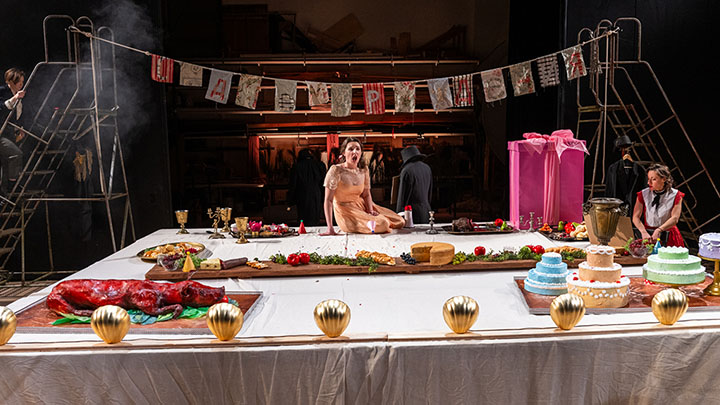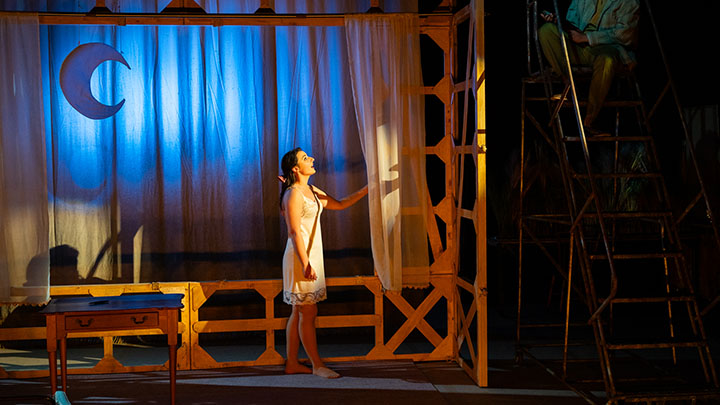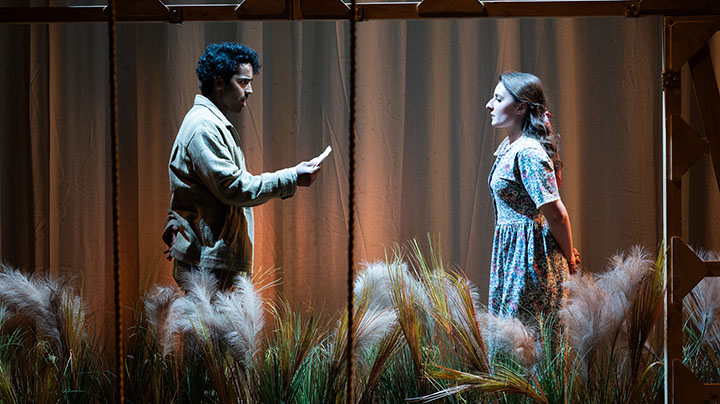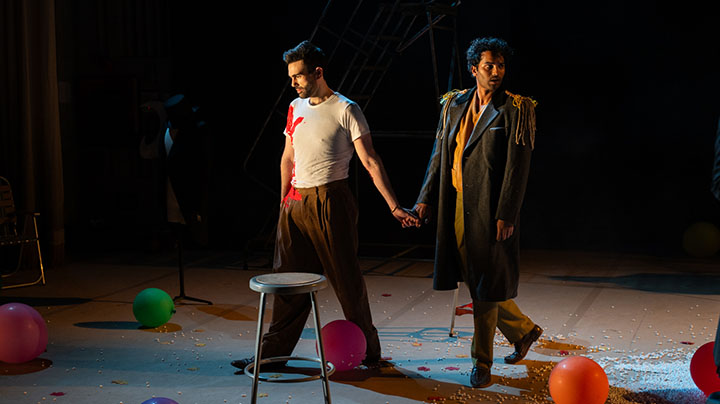Redundant, perhaps, but the fact is that if every component of Heartbeat Opera’s Eugene Onegin, adapted by Dustin Wills and Jacob Ashworth and newly arranged by Dan Schlosberg, weren’t as bold, self-assured, and inventive as it is, the piece’s radical departure from Tchaikovsky’s original would be hard to swallow. As it was, the fast-paced and imaginative staging, the lean and efficient cut, the wild and ever-so-slightly wacky musical arrangement, and the self-assured performances were totally convincing: a fresh and eloquent new reading of a beloved classic.
Cut to just over 100 minutes and with a new musical arrangement, the Heartbeat team’s Onegin was remarkably pared down. With just seven singers in the cast and nine musicians in the band, including Ashworth conducting from the violin, gone were the peasant chorales and nearly all of the dances (the polonaise, too significant to cut, was brutally recontextualized as a menacing whirlwind scoring Onegin’s post-duel dissolution).
The instrumentation itself was certainly unconventional, including electric bass and guitar, harp and saxophone as well as more conventional strings and a clarinet. Unexpected musical touches abounded, like the dreamy, tremolo guitar that gave Olga’s aria an almost country western air, or the raw edge of an electric violin sowing seeds of danger into the party music. The word that springs to mind is “irreverent”—certainly this is no piece for purists—but even the most radical departures in the score felt undertaken with confidence and purpose.
In his program note, Wills, also the production’s director, writes that he hopes that this new Onegin will allow audiences to “re-hear the music and story in a profoundly new way.” Certainly, Schlosberg’s arrangement offered a new way of hearing Tchaikovsky’s music. What was striking was how eloquently the sounds and styles of the music matched the aims and aesthetics of the production as a whole.
The music’s orientation towards unexpected sounds and new combinations matched the production’s modular, efficient set, designed by Wills, that saw actors and stage hands reconfiguring recurring components (a table, two rolling ladders, a few sheets of drywall) into new set pieces before the audience’s eyes. It matched, too, a similarly modular and efficient approach to adaptation; Triquet’s verses, for example, were given to Olga (Sishel Claverie), a brilliant use of a character who never gets enough to do.
In fact, the fast-paced and economical cutting and staging of Eugene Onegin worked in favor of its cast, all of whom were in fine voice and able to connect with their audience. Emily Margevich’s Tatyana was a standout, her voice big and luxurious, with a cascading quality, like a bolt of silk dropped from a balcony. She played the letter aria with ferocity, sweetness, and a palpable sense of fear at her own capacity for sexual derangement. Edwin Joseph as Onegin made a fine object for her obsession, with his handsome looks and head of dark curls. If Margevich’s voice was rippling silk, Joseph’s was like oiled leather—supple and dark.
As Lensky, Roy Hage sang with a passion and force that seemed to clarify the more distressed his character became; a slight awkwardness and constraint in “Ya lyublyu vas” became a ringing, open sound by “Kuda kuda.” Sishel Claverie as Olga had the effortless charm to match her effortless low notes. Shannon Delijani and Tynan Davis, as Madame Larina and the Larin girls’ nurse, respectively, were scene stealers, playing wryly around the edges of the young lovers’ high drama.
Charismatic, confident, and light-on-its feet, this Onegin reminded me less of other opera stagings I’ve seen and more of my favorite productions of Shakespeare’s plays—productions undertaken from the assumption that the staging is a collaboration between the work and the company, rather than a transmission of a stable text or score. This working relationship between text and performers can, at its best, lead to productions that abound with interpretive choices and that use every moment onstage to draw the audience deeper into their world. Heartbeat’s Onegin, for example, was full of sight gags and schticky character moments, like Tatyana lugging a bright pink present the size of herself around her disastrous party, or an embarrassed Olga pleading with the band to shut down Lensky’s aria.
This same interpretive autonomy and attention to character also paid off in the production’s other radical intervention, its explicitly gay staging of the Onegin/Lensky relationship. Shifting Onegin and Lensky from an intimate, homoerotic friendship to a tragic love affair added depth to both of their characters, especially as played by Joseph and Hage, who had great chemistry.
In the party scene, for example, where their friendship rapidly disintegrates into an enmity that will end with Lensky dead at Onegin’s hand, Lensky’s wounded volatility was the anger of a man watching the woman he hopes to marry be seduced by the cynic who has already seduced him, while Onegin’s instigations read as the self-sabotage of a man about to lose his lover to marriage and normativity.
It was a compelling reading, and an example of the “re-hearing” Wills describes in his program note; of course the homoeroticism of Onegin’s and Lensky’s friendship has always been a part of Tchaikovsky’s opera, but an adaptation that pulls that subtext to the surface presents an exciting opportunity to hear the queerness of Onegin anew.
If I have one quibble with the Heartbeat team’s queer reading of Onegin, it’s that after investing so much interpretive thought and energy into the Onegin/Lensky relationship, it didn’t quite know what to do with the last act—and with Tatyana. Staging the final confrontation between Tatyana and Onegin on a ramshackle stage-within-a-stage, the production presented Tatyana as another kind of queer figure: a diva, trapped by the strictures of femininity, of opera itself, perhaps. At one point, she tried to end the miserable back-and-forth with Onegin by climbing down off the stage and fleeing into the house; the other ensemble members, however, picked her up and set her bodily back down within the melodrama.
Like everything else about the staging, these metatheatrical flourishes were compelling and well-executed. They struck me, however, as a slightly missed opportunity to read Tatyana not as a metaphor for queer performance but as a character with the same depth and relationality as Onegin and Lensky. Tatyana, after all, is already a queer figure—not just as a diva but as a woman. As Wayne Koestenbaum observed in The Queen’s Throat, her letter aria is a coming-out, a vulnerable and sublime outpouring of secret desire.
“Queerness isn’t a private condition,” Koestenbaum writes of Tatyana’s aria, “It occurs in public. Tatyana divulges, divulges, divulges.” If this wonderful new imagining of Eugene Onegin is in search of a mission statement, it could certainly do worse than that.
Photos: Russ Rowland







